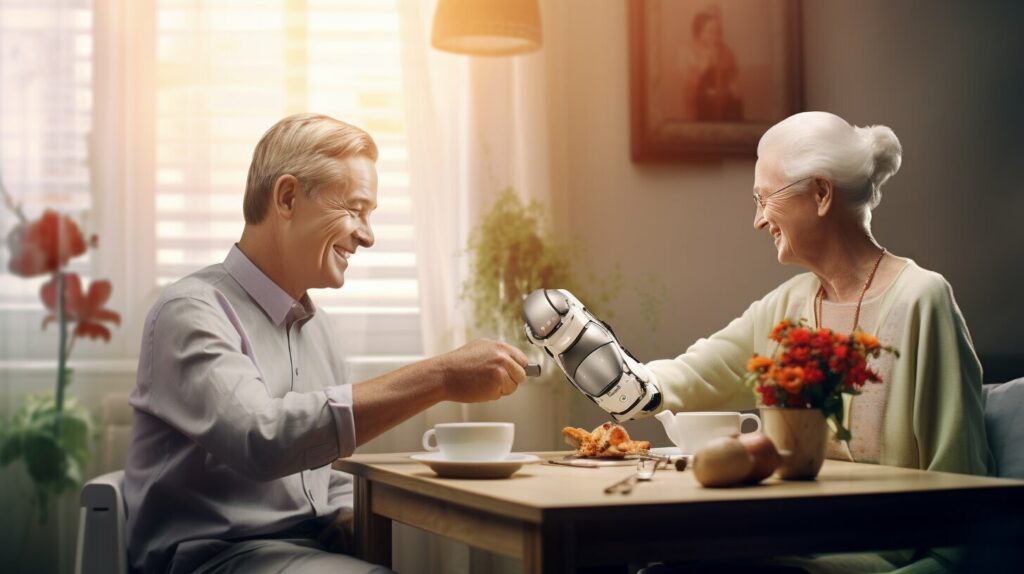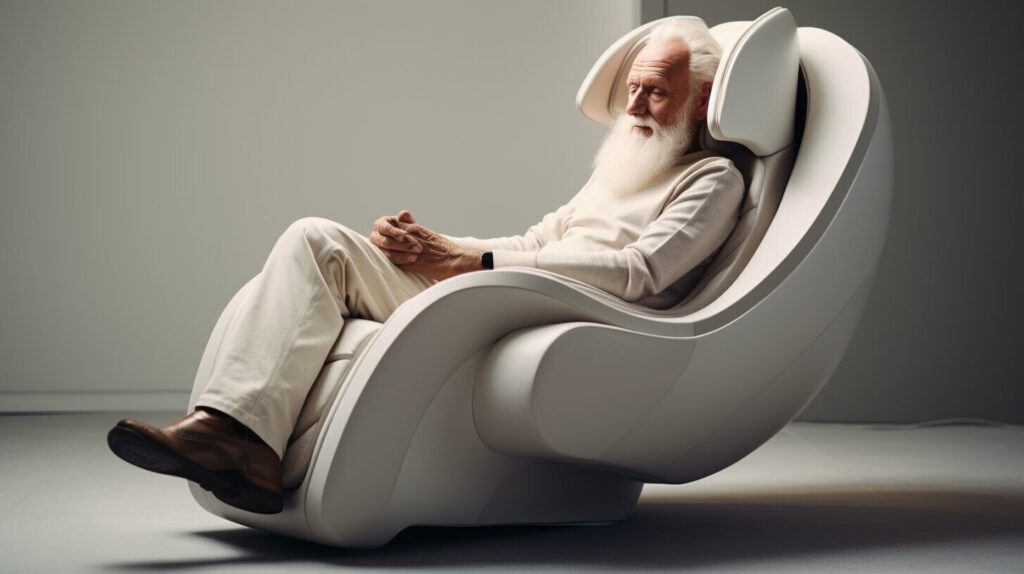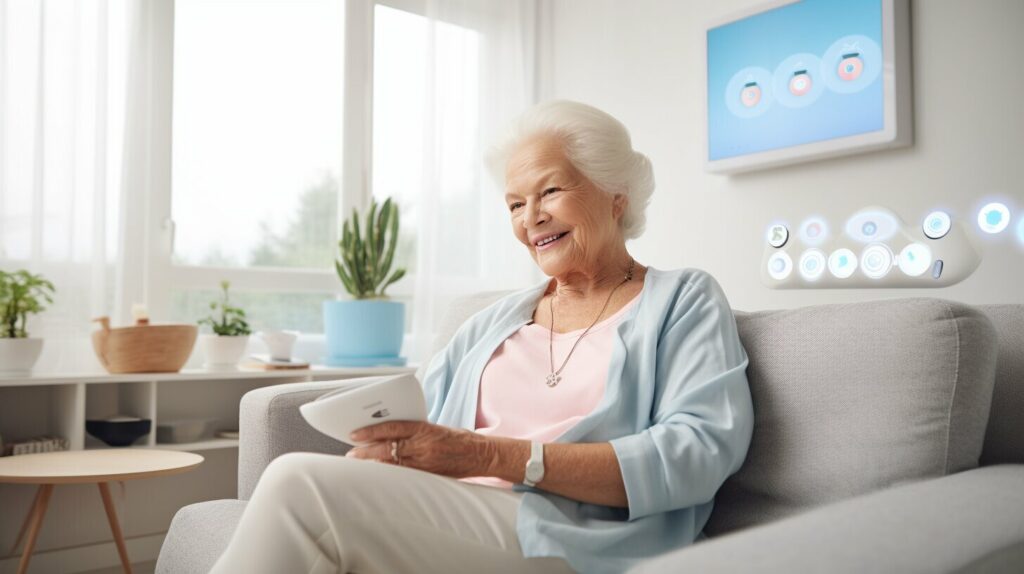Our organization is dedicated to revolutionizing elderly care by leveraging AI healthcare for older adults. With the rising population of the elderly, it becomes crucial to explore innovative methods to meet the growing needs of this age group. Implementing AI in healthcare offers a great potential to enhance personalized care while also reducing the overall healthcare costs.
According to projections, the percentage of seniors aged 65 and above in the United States is expected to increase from 17% to 22% by 2050. This demographic shift, coupled with rising healthcare costs, necessitates a transformative approach to senior care. The average median cost of in-home care is projected to skyrocket from $4,500 to $11,000 a month by 2050, making it imperative to explore AI technology as a cost-effective solution.
AI in elder care brings a multitude of benefits, including the ability to mimic human analysis, accelerate clinical workflows, and efficiently identify health problems. This technology enables us to provide smarter, safer, and more personalized care for older adults. From AI-powered home assistants and portable devices to smart home hubs and monitoring systems, AI is reshaping the landscape of senior healthcare.
Key Takeaways:
- AI healthcare for older adults is a game-changer for the senior living industry.
- AI technology in healthcare can deliver better and more personalized care while reducing costs.
- The aging population and rising healthcare expenses necessitate innovative solutions.
- AI in elder care offers benefits such as mimicking human analysis and accelerating clinical workflows.
- AI-powered home assistants, portable devices, and smart home hubs transform the way we care for seniors.
The Benefits of AI in Elder Care
Artificial Intelligence (AI) technology has revolutionized the field of elder care, offering numerous benefits for older adults. By leveraging AI solutions, healthcare providers can deliver smarter, safer, and more personalized care, ultimately improving the quality of life for seniors.
One of the key advantages of AI in elder care is its ability to mimic human analysis and understand healthcare data. AI algorithms can quickly analyze vast amounts of medical information, helping healthcare professionals detect health problems and identify potential risks with greater efficiency.
Additionally, AI technology has the potential to significantly reduce the cost of caring for older adults. By automating certain tasks and streamlining workflows, AI systems can help mitigate the financial burden associated with elderly care. This, in turn, allows healthcare providers to allocate resources more effectively and provide better care to a larger number of seniors.
Specific applications of AI in senior healthcare include home assistants, portable devices and wearables, smart home hubs and monitoring systems, and smart implants. These technological advancements enable seniors to receive continuous care in the comfort of their own homes, while also providing healthcare professionals with real-time insights into a patient’s well-being.
The Benefits of AI in Elder Care
| Advantages | Examples |
|---|---|
| Mimics human analysis and understands healthcare data | AI algorithms can quickly analyze medical information, detect health problems, and identify risks. |
| Reduces the cost of caring for older adults | Automation and streamlined workflows help mitigate the financial burden associated with elderly care. |
| Enables continuous care at home | Home assistants, wearable devices, and monitoring systems provide real-time insights into a patient’s well-being. |
In conclusion, AI advancements in elder care have the potential to transform the way healthcare is delivered to older adults. By harnessing the power of AI technology, we can provide smarter, safer, and more personalized care, ultimately enhancing the well-being and quality of life for seniors.

Home Assistants for Independent Living
Home assistants powered by artificial intelligence (AI) are transforming the way seniors live independently. These AI-enabled devices provide daily assistance, monitoring, and companionship for older adults who may be living alone.
One such example is the ElliQ robot. With its advanced capabilities, ElliQ engages seniors in various activities to keep them mentally stimulated and socially connected. Through video calling, seniors can stay in touch with their family and friends, reducing feelings of isolation. Additionally, home assistants like ElliQ can also serve as reminders for important tasks such as taking medications and staying hydrated.
Another AI-powered home assistant is the Mabu robot. Designed to provide personalized care and support, Mabu interacts with seniors by engaging in conversations, answering questions, and offering companionship. It can also monitor and track vital signs, reminding seniors of necessary health check-ups and appointments.
| Home Assistants for Independent Living | Features and Benefits |
|---|---|
| ElliQ robot |
|
| Mabu robot |
|
These AI-enabled home assistants are revolutionizing the way older adults can age in place. By providing support, companionship, and personalized care, these devices offer seniors greater independence and peace of mind. As the field of AI in elder care continues to evolve, home assistants will play an increasingly vital role in ensuring the well-being and quality of life for aging populations.
Portable Devices and Wearables for Health Monitoring
When it comes to senior healthcare, portable devices and wearables equipped with AI technology are revolutionizing the way we monitor and manage health. These innovative devices provide older adults with the ability to track vital signs and predict potential emergencies, empowering them to take control of their own well-being.
One such device is the Apple Watch, a popular wearable that offers a range of health monitoring features. With its built-in heart rate monitor, fall detection, and activity tracker, the Apple Watch provides seniors with real-time data to better understand their overall health and take necessary precautions.
In addition to smartwatches, companies like CarePredict have developed wearable devices specifically designed for elderly healthcare. Their Tempo Series 3 wearable uses AI algorithms to analyze data collected from the wearer, such as their activity levels, sleep patterns, and hygiene habits. This data is then used to identify any potential health issues and provide personalized recommendations for improved well-being.
By leveraging AI technology in portable devices and wearables, older adults can proactively monitor their health, detect early warning signs, and make informed decisions about their care. These devices not only promote independence and peace of mind for seniors, but also enable healthcare providers to deliver more efficient and personalized care.

Smart Home Hubs and Monitoring Systems for Safety
In the realm of AI-enabled healthcare for older adults, smart home hubs and monitoring systems play a crucial role in ensuring the safety and well-being of seniors. These innovative technologies leverage artificial intelligence to provide remote monitoring and enhance the overall care experience.
Smart home hubs, such as Alarm, utilize sensors to detect any unusual activity or changes in routine within the senior’s home. This enables caregivers or family members to receive real-time alerts and take necessary action if any concerns arise. Additionally, these systems can automatically adjust home settings, such as turning on lights or locking doors, to enhance security and provide peace of mind.
By integrating AI technology, smart home hubs and monitoring systems deliver personalized and proactive care, allowing seniors to maintain their independence while ensuring their safety. With the ability to analyze data and identify patterns, these systems have the potential to detect potential health risks or emergencies before they escalate, providing early intervention and mitigating potential harm.
The Benefits of Smart Home Hubs and Monitoring Systems for Seniors
1. Enhanced Safety: AI-powered sensors can detect unusual activities or changes in routine, allowing for immediate intervention in case of emergencies or potential risks.
2. Peace of Mind for Seniors and Caregivers: With remote monitoring capabilities, both seniors and their caregivers can have peace of mind knowing that help is readily available if needed.
3. Personalized and Proactive Care: By analyzing data and identifying patterns, smart home hubs and monitoring systems can deliver personalized care and early intervention, optimizing the overall well-being of seniors.
| Benefits | Examples |
|---|---|
| Enhanced Safety | Alarm |
| Peace of Mind | SmartThings |
| Personalized Care | Google Nest Hub |
Overall, smart home hubs and monitoring systems equipped with AI technology are revolutionizing senior healthcare by providing enhanced safety, personalized care, and peace of mind for both seniors and their caregivers. As the aging population continues to grow, these advancements in AI-assisted healthcare technology play a pivotal role in ensuring the health and well-being of older adults.
Smart Implants for Personalized Care
In the realm of AI technology in elderly care, smart implants are emerging as a game-changer, offering personalized care and real-time data for better management of health conditions. These implantable devices provide diagnostic and therapeutic benefits, improving patient outcomes and potentially reducing healthcare costs.
One remarkable example is Glysens’ implantable glucose sensor, which continuously monitors blood glucose levels for individuals with diabetes. This device eliminates the need for frequent finger pricks and allows for more accurate diabetes management. Another notable smart implant is Orthosensor’s implant in the knee, which provides detailed data on joint movement and pressure, aiding in postoperative care and recovery.
“Smart implants offer a new level of insight into patients’ health conditions, allowing for personalized and data-driven treatment plans,” says Dr. Jane Adams, a leading expert in geriatric medicine. “These devices empower both patients and healthcare professionals with the information needed to make informed decisions.”
The integration of smart implants with AI technology opens up possibilities for proactive and individualized care. By leveraging AI algorithms, these implants can analyze data in real-time, identify patterns, and provide timely alerts to healthcare providers. This enables early intervention and personalized treatment plans tailored to each patient’s unique needs.

The Potential of AI-Enabled Smart Implants
Smart implants have the potential to revolutionize the way we approach healthcare for older adults. By combining AI technology with these implantable devices, we can enhance patient monitoring, improve treatment outcomes, and promote proactive care. These advancements in personalized care not only benefit patients but also alleviate the burden on caregivers and healthcare systems.
| Smart Implant | Function |
|---|---|
| Glysens’ implantable glucose sensor | Continuous monitoring of blood glucose levels |
| Orthosensor’s implant in the knee | Detailed data on joint movement and pressure |
As AI continues to evolve and integrate with healthcare technologies, we can expect further advancements in smart implants. These innovations hold great promise for improving the quality of life for older adults and addressing the healthcare challenges associated with an aging population.
Building Trust in AI-Enabled Healthcare
In the rapidly evolving world of healthcare technology, AI has emerged as a powerful tool with the potential to revolutionize elderly care. However, to fully harness its benefits, it is crucial to build trust in AI-enabled healthcare solutions. Trust is especially vital in the healthcare industry, where the well-being and safety of seniors are at stake.
Companies like HealthEM.AI are focusing on transparency to ensure trust in AI systems. By providing care managers with the ability to understand the recommendations made by AI, these companies are demystifying the black box nature of AI algorithms. This transparency helps build confidence in the system and allows caregivers to make informed decisions based on AI-generated insights.
Transparency goes beyond simply showing the output of AI algorithms. It involves explaining the underlying processes, data sources, and the logic behind the recommendations. This thorough understanding helps caregivers and healthcare professionals overcome skepticism and adopt AI solutions with confidence. When AI systems are transparent and explainable, they become a valuable tool in augmenting human decision-making and enhancing the quality of care for older adults.
The Role of Regulation and Ethical Guidelines
Regulation and ethical guidelines also play a significant role in building trust in AI-enabled healthcare. Clear guidelines ensure that AI systems are developed, deployed, and used in an ethical manner, prioritizing patient privacy, security, and well-being. Additionally, regulation helps establish standards for data privacy and security, ensuring that sensitive health information is protected.
By adhering to these regulations and ethical guidelines, companies can demonstrate their commitment to the responsible and ethical use of AI in healthcare. This not only builds trust among caregivers and healthcare professionals but also reassures seniors and their families that their personal information and well-being are safeguarded.
Incorporating User Feedback and Collaboration
Another crucial aspect of building trust in AI-enabled healthcare is incorporating user feedback and fostering collaboration. By involving caregivers, healthcare professionals, and seniors themselves in the development and evaluation of AI solutions, companies can ensure that the technology meets their needs and addresses their concerns.
Regular feedback loops, user testing, and co-creation sessions allow stakeholders to provide input, voice concerns, and shape the development of AI-enabled healthcare. This collaborative approach not only helps build trust but also leads to the creation of more user-friendly and effective solutions.
| Benefits of Building Trust in AI-Enabled Healthcare | Examples |
|---|---|
| Increased adoption and acceptance of AI solutions | Healthcare providers embracing AI-powered remote monitoring systems for seniors |
| Improved patient outcomes and satisfaction | Seniors experiencing personalized care and proactive interventions through AI-powered wearable devices |
| Efficient and effective decision-making | Caregivers leveraging AI-powered predictive analytics to identify health risks and optimize care plans |
| Reduced healthcare costs | Healthcare organizations implementing AI-powered solutions for early detection and prevention of health issues in seniors |
Building trust in AI-enabled healthcare is a continuous process that requires collaboration, transparency, and adherence to ethical guidelines and regulations. As AI technology continues to advance, establishing trust becomes increasingly important to unlock its full potential in delivering smarter, safer, and more personalized care for older adults.

AI as a Supplement to Caregivers
AI technology is revolutionizing the field of elder care, providing innovative solutions to enhance the quality of life for older adults. However, it is important to recognize that AI should be seen as a supplement to caregivers and healthcare professionals, rather than a replacement. By working in tandem with AI tools and systems, caregivers can provide more efficient and personalized care, ultimately improving patient outcomes and experiences.
Enhancing Productivity and Quality of Care
AI tools, such as care management platforms and predictive fall risk assessment systems, can significantly enhance the productivity and quality of care provided by caregivers. Care management platforms utilize AI algorithms to analyze patient data, providing valuable insights and recommendations for personalized care plans. This enables caregivers to make more informed decisions and deliver targeted interventions, leading to better health outcomes for older adults.
Predictive fall risk assessment systems, powered by AI, can help caregivers identify and prevent falls, a common concern among seniors. These systems analyze a variety of factors, such as gait patterns and environmental conditions, to accurately predict fall risk. By leveraging this technology, caregivers can implement proactive measures to reduce fall incidents and ensure the safety of older adults, allowing them to maintain their independence for longer.
The Human Touch in Care
While AI provides valuable support and efficiency in elder care, it is essential to recognize the irreplaceable value of the human touch in caregiving. Caregivers offer emotional support, companionship, and empathy, elements that cannot be replicated by technology alone. The combination of AI technology and human caregivers creates a holistic and comprehensive approach to senior healthcare, addressing both physical and emotional needs.
By embracing AI as a supplement to caregivers, the healthcare industry can harness the full potential of technology while ensuring the delivery of compassionate and person-centered care for older adults. The collaboration between AI and caregivers is key to achieving optimal outcomes and improving the overall well-being of seniors.

| AI as a Supplement to Caregivers | Advantages |
|---|---|
| Enhanced productivity | AI tools enable caregivers to streamline workflows and make informed decisions, improving the efficiency of care delivery. |
| Personalized care | By leveraging AI algorithms, caregivers can develop tailored care plans that address the unique needs and preferences of each older adult. |
| Fall prevention | Predictive fall risk assessment systems help caregivers identify and mitigate fall risks, ensuring the safety of older adults. |
| Comprehensive approach | The combination of AI technology and human caregivers delivers a holistic approach to senior healthcare, addressing both physical and emotional needs. |
The Future of AI in Senior Healthcare
The future of healthcare technology is advancing rapidly, and AI is at the forefront of these advancements. As the population of older adults continues to grow, there is a pressing need for innovative solutions that can meet their evolving healthcare needs. AI has the potential to revolutionize senior healthcare by delivering personalized care, improving patient outcomes, and reducing healthcare costs.
One of the key use cases of AI in senior healthcare is the development of AI-powered home assistants. These intelligent robots, such as the ElliQ and Mabu robots, can provide daily assistance, monitoring, and companionship to seniors living alone. They engage seniors in activities to keep them mentally active, enable them to stay connected with loved ones through video calling, and even provide reminders for medication and hydration. These AI-powered home assistants play a crucial role in supporting independent living for older adults.
Another area where AI is making waves is in the development of portable devices and wearables for health monitoring. Devices like Apple Watches and CarePredict’s Tempo Series 3 wearable allow seniors to track their vital signs, such as heart rate and blood glucose levels. They can also detect falls through features like fall detection, providing a crucial safety net for older adults and their caregivers. These AI-enabled devices empower seniors to take control of their health and predict potential emergencies.
In addition, smart home hubs and monitoring systems are leveraging AI technology to enhance the safety and well-being of older adults. These systems use sensors to detect unusual activity or changes in routine, automatically adjusting home settings for added security. For example, the Alarm system can turn on lights or lock doors based on detected patterns. By providing remote monitoring and real-time alerts, these AI-powered systems give seniors and their caregivers peace of mind.
The future of AI in senior healthcare also includes the development of smart implants. Implants like Glysens’ glucose sensor and Orthosensor’s knee implant offer real-time data that can help manage health conditions and track postoperative care. These smart implants provide diagnostic and therapeutic benefits, improving patient outcomes and potentially reducing healthcare costs.

Summary
AI has the potential to transform the way we provide healthcare to older adults. Whether it’s through AI-powered home assistants, portable devices for health monitoring, smart home hubs, or smart implants, AI technology is paving the way for smarter, safer, and more personalized care. As the aging population continues to grow, AI will play an increasingly important role in meeting the healthcare needs of seniors, improving their quality of life, and reducing the burden on healthcare systems. The future of AI in senior healthcare is bright, offering innovative solutions for the well-being and care of older adults.
Conclusion
AI technology in senior healthcare has the potential to revolutionize the way we care for older adults. By leveraging AI-enabled solutions, we can provide smarter, safer, and more personalized care for our aging population. The use of AI in home assistants, portable devices, smart home hubs, and smart implants allows us to improve patient outcomes and address the rising costs of care.
Trust is a vital component in the successful implementation and integration of AI in senior healthcare. By focusing on transparency and collaboration between AI systems and caregivers, we can build confidence in the capabilities of AI-enabled solutions. This trust is necessary to ensure that seniors receive the best possible care and support.
The future of AI in senior healthcare looks promising. As life expectancy continues to increase and healthcare expenditures rise, AI technology provides innovative solutions to meet the growing needs of older adults. By embracing AI-enabled healthcare for older adults, we can enhance the well-being and quality of life for our seniors while driving down healthcare costs.
FAQ
What is the projected increase in the senior population in the United States?
Seniors aged 65 and above currently make up about 17% of the population in the United States, with a projected increase to 22% by 2050.
What are the benefits of AI in elder care?
AI in elder care offers numerous benefits, including the ability to mimic human analysis and understand healthcare data, speed up clinical workflows, and efficiently identify health problems.
What are some specific applications of AI in senior healthcare?
Some specific applications of AI in senior healthcare include home assistants, portable devices and wearables, smart home hubs and monitoring systems, and smart implants.
How do home assistants help seniors living alone?
Home assistants, such as the ElliQ robot and the Mabu robot, provide daily assistance, monitoring, and companionship for seniors living alone. They engage seniors in activities, keep them mentally active, allow them to stay connected with family and friends through video calling, and provide reminders for tasks like taking medications or staying hydrated.
What do portable devices and wearables for health monitoring do?
Portable devices and wearables, like Apple Watches and CarePredict’s Tempo Series 3 wearable, enable seniors to monitor their health and predict potential emergencies. These devices track vital signs, such as heart rate and blood glucose levels, and can even detect falls through features like fall detection.
How do smart home hubs and monitoring systems ensure the safety of seniors?
Smart home hubs and monitoring systems, such as Alarm, provide remote monitoring to ensure the safety and well-being of seniors. These systems use sensors to detect unusual activity or changes in routine and can automatically adjust home settings, such as turning on lights or locking doors, for added security.
What are some examples of smart implants in senior healthcare?
Examples of smart implants in senior healthcare include Glysens’ implantable glucose sensor and Orthosensor’s implant in the knee. These implants offer real-time data to help manage health conditions and track postoperative care, providing diagnostic and therapeutic benefits.
How can trust be built in AI-enabled healthcare solutions?
Trust in AI-enabled healthcare solutions can be built through transparency. Companies like HealthEM.AI focus on transparency, allowing care managers to understand the recommendations made by AI systems. The goal is to demonstrate how and why AI is functioning, ensuring trust in the system.
What is the role of AI as a supplement to caregivers?
AI tools like care management platforms and predictive fall risk assessment systems can enhance the productivity and quality of care provided by caregivers. AI should be seen as a supplement, not a replacement, to caregivers and staff members in the healthcare industry.
What is the future of AI in senior healthcare?
The future of AI in senior healthcare looks promising, offering innovative solutions for the well-being and quality of life of older adults. AI technology has the potential to revolutionize senior care, providing smarter, safer, and more personalized care while reducing healthcare costs.
In an era where technology intersects with every aspect of life, Maxwell bridges the gap between artificial intelligence and journalism. As a writer and AI expert, he explores the implications of emerging technologies on society, economy, and culture. Maxwell’s expertise allows Press Report to offer forward-thinking insights into the future of AI, making complex topics accessible and engaging for our audience.










